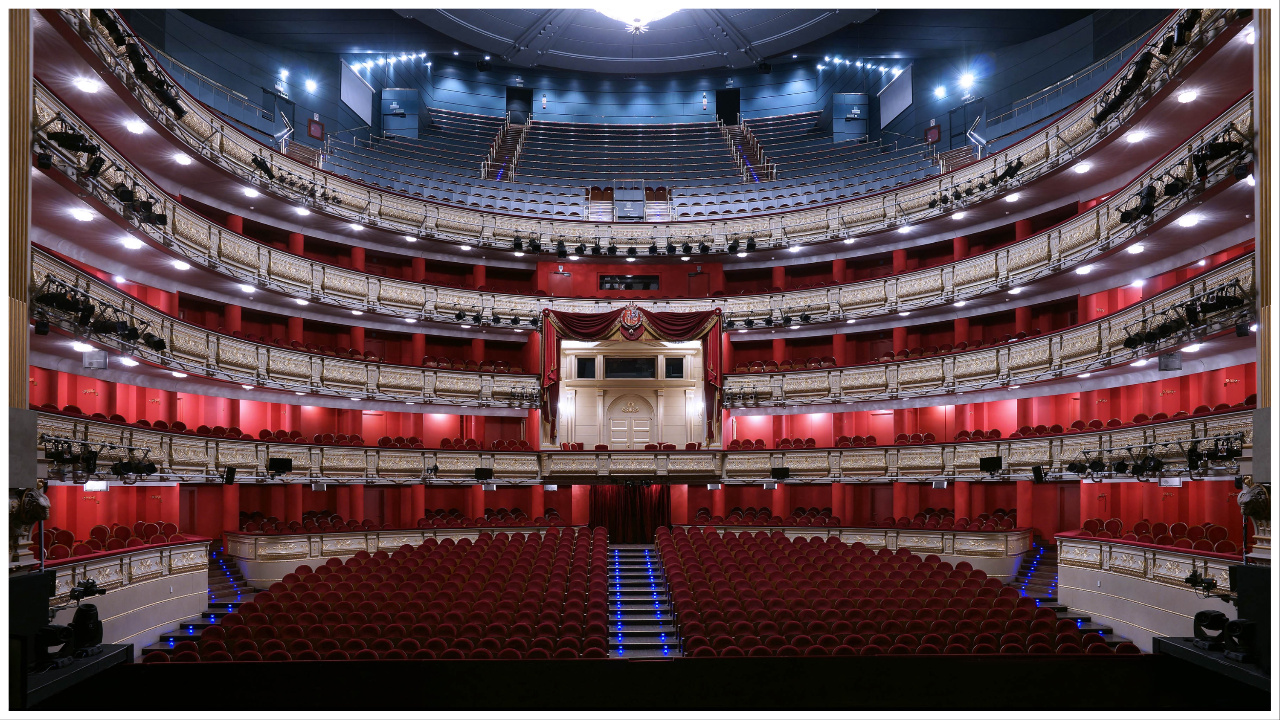
(Photo Credit: Javier del Real)
On October 16, 2023, Spain’s eminent performing arts company, Teatro Real, returned to New York City for a gala concert at the newly-reopened David Geffen Hall. The program was comprised of a selection of classical and flamenco works, passionately delivered by the Orchestra of the Teatro Real, under conductor Juanjo Mena, and special guest artists. Together, they painted a vast array of musical folklore from around the world.
Opening the program was Argentinian composer Alberto Ginastera’s “Panambi Suite, Op. 1,” which draws from Guarani and Amerindian influences. The piece built up a dense texture of sound through its opening movement, “Moonlight on the Parana.” Rising from suitably-earthy tones from the brass, each section piled on their voices to carry or expand upon the previous ideas until this aural ecosystem was lit up by the running harps and ethereal chimes, all coming together to evoke the noctilucent beauty of the jungle, before softly tapering back into the silent dark. The next movement, “Invocation to the Spirits of Power,” established itself instantly through the driving rhythm of the drums, punctured by sharp stabs from the brass and crashing cymbals. All of this collided in a brief but primal display of power, which seemed to wash away just as fast as it had arrived with the introduction of the poignant string theme for “The Girls’ Lament.” The wave-like figures of the strings made a despondent undercurrent, briefly carried by a solo flute, as these elements exchanged and eased into one another, paving away for the final movement, “Native Festival – Girls’ Round Dance – Warriors Dance.” Here the drums and fervor returned, with weighty chords pivoting naturally into either light runs from the strings and winds, or more frantic measures driven fiercely onward by the cellos. This piece made for a captivating introduction to what was to follow through the evening.
Next in the program was Dvorak’s “Cello Concerto in B minor, Op. 104, B. 191.” Performed by renowned cellist Pablo Ferrandez, the work made a thrilling showcase of the instrument’s versatility. As the strings and winds elaborated on the initial oboe theme in the opening “Allegro” movement, Ferrandez joined with a flourish that soon announced a wealth of interpretive technique, allowing him to dole out staccato phrases with great dexterity, or to engage in more lyrical measures in dialogue with the winds and brasses. Drawing from Bohemian influences, and the death of the composer’s wife’s sister, the piece bears elements which range from warm and affection to stately and dirge-like, yet all of these disparate feelings were given ample exploration through the orchestra and Ferrandez’s rendition.
Following the intermission, the concert continued with Spanish composer Manuel de Falla’s ballet “El amor brujo.” The work is Andalusian in nature, with elements of Roma tradition, as well as influence from Debussy and Ravel. The plot, in a nutshell, follows Candela, a woman who is prevented from being with her lover Carmelo due to the interference of the ghost of Candela’s husband, with whom she is in love. When her attempts to free herself through spells and incantations fail, she manages to reveal the unfaithful nature of her former husband by luring him with an old flame, allowing her to finally be with Carmelo at the tolling of dawn’s bells.
Leading flamenco performer Esperanza Fernandez truly seized the most of her time onstage, riding on the passionate theme of the brassy fanfare and Spanish color, to open with an aggrieved recitation as she tries to divine her fate through a deck of cards. Her every gesture was rich with meaning and emotional nuance as she kept time with the orchestra and alternated between recitation and sung phrases. The work itself is structured in two acts of 16 smaller scenes, which carried with tremendous energy over its runtime of roughly 20 minutes. Between Fernandez’s interpretation and the expertise of the orchestra, watching this felt like experiencing a condensed opera where all the fervor and intensity is put on full display. This was a true highlight of the evening’s program.
Bringing things to a close were two suites from Ravel’s own ballet “Daphnis et Chloe,” which draws from Greek folklore as well as influence from Debussy. This selection let the orchestra present a relatively modern take on the mythic tale, executed with utter sonority and splendid taste. To watch the orchestra work was itself a delight, made all the more impactful not just by Mena’s expertise as a conductor, but the enthusiasm and enjoyment that is clear to see at play.
There was much to enjoy from Monday’s gala concert, with the three encores ensuring that audience members got the most from this one-night-only event. Under Mena’s baton, one felt transported to the Madrid opera house, capturing one’s attention and excitement as few conductors can. As Teatro Real looks to share their gifts with international audiences, and develop the relationship between New York City and Madrid, one can only hope that this yearly concert will pave the way for further presentations within New York and throughout America.
